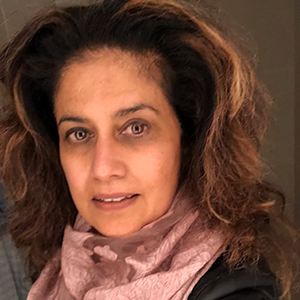Dr. Minnie Sarwal is co-founder and Chief Medical Officer for KIT Bio, a start-up focused on developing a urine-based testing platform to support kidney disease management. She is a renowned nephrologist who has led a federally-funded research lab at UCSF since 1997, where she is also Professor of Surgery and leader of the Precision Medicine Program in solid organ transplantation and kidney disease. She has over 30 years of clinical experience and 25 years of research experience in translational immunogenetics, genomics, proteomics and informatics. Read her full bio.
Interview with Minnie Sarwal of UCSF
Q: Genomic medicine is entering more hospitals and bringing with it non-invasive technology that can be used to better target and treat diseases. What are some key milestones that contributed to this trend?
A: Completion of complete sequence data from the human genome project, and the advances in proteomic, microRNA and epigenetic assays added a layer of pathway biology to the understanding of human diseases. In addition, a greater understanding of the complexity of human disease led to the understanding that standard of care correlative markers did a poor and overly simplistic job of disease classification and often failed at disease prediction.
Q: What technological advancements are driving this change?
A: The rapid pace of sequencing and other omic assays, lowered assay costs and greater computational power are key advances driving this change.
Q: What are some specific examples in how Genomic Medicine is improving healthcare?
A: The personalization of assessment disease and health status is key. Examples in cancer are prediction of recurrence risk by the Genomic health breast cancer assay. Another example in transplant medicine is the blood multigene kSORT assay for predicting rejection risk after transplant 3 month before standard of care measures such as serum creatinine. In this talk I will also discuss a new assay that can predict rejection risk specific for each donor/recipient pair, even before transplantation.
Q: What is required to see a more wide-spread adoption in the clinical sector?
A: Great science is key. Great assay specs are essential. Peer review is critical.
Q: There are some obvious hurdles we need to overcome, which include but are not limited to: a. addressing the reimbursement challenges, b. ensuring access to genetic counseling for everyone, c. having access to technological solutions that support genomic data at scale, d. testing for mainstream medical practice, e. or having access to population biobanks. i. Can you speak to one or many of the above mentioned hurdles and how we can best address them as a community within the ecosystem of genomic medicine?
A: For assimilation of the assay in general medical practice the assay has to be easy to use and not interfere with the clinical work flow, with low turn around time with the ideal being a point of care solution, integrated with the EHR, with low cost of goods. This is a high bar but much needed to break the quagmire of slow to adopt diagnostic assays.
The Precision Medicine World Conference (PMWC), in its 17th installment, will take place in the Santa Clara Convention Center (Silicon Valley) on January 21-24, 2020. The program will traverse innovative technologies, thriving initiatives, and clinical case studies that enable the translation of precision medicine into direct improvements in health care. Conference attendees will have an opportunity to learn first-hand about the latest developments and advancements in precision medicine and cutting-edge new strategies and solutions that are changing how patients are treated.
See 2019 Agenda highlights:
- Five tracks will showcase sessions on the latest advancements in precision medicine which include, but are not limited to:
- AI & Data Science Showcase
- Clinical & Research Tools Showcase
- Clinical Dx Showcase
- Creating Clinical Value with Liquid Biopsy ctDNA, etc.
- Digital Health/Health and Wellness
- Digital Phenotyping
- Diversity in Precision Medicine
- Drug Development (PPPs)
- Early Days of Life Sequencing
- Emerging Technologies in PM
- Emerging Therapeutic Showcase
- FDA Efforts to Accelerate PM
- Gene Editing
- Genomic Profiling Showcase
- Immunotherapy Sessions & Showcase
- Implementation into Health Care Delivery
- Large Scale Bio-data Resources to Support Drug Development (PPPs)
- Microbial Profiling Showcase
- Microbiome
- Neoantigens
- Next-Gen. Workforce of PM
- Non-Clinical Services Showcase
- Pharmacogenomics
- Point-of Care Dx Platform
- Precision Public Health
- Rare Disease Diagnosis
- Resilience
- Robust Clinical Decision Support Tools
- Wellness and Aging Showcase
See 2019 Agenda highlights:
- Five tracks will showcase sessions on the latest advancements in precision medicine which include, but are not limited to:
- AI & Data Science Showcase
- Clinical & Research Tools Showcase
- Clinical Dx Showcase
- Creating Clinical Value with Liquid Biopsy ctDNA, etc.
- Digital Health/Health and Wellness
- Digital Phenotyping
- Diversity in Precision Medicine
- Drug Development (PPPs)
- Early Days of Life Sequencing
- Emerging Technologies in PM
- Emerging Therapeutic Showcase
- FDA Efforts to Accelerate PM
- Gene Editing / CRISPR
- Genomic Profiling Showcase
- Immunotherapy Sessions & Showcase
- Implementation into Health Care Delivery
- Large Scale Bio-data Resources to Support Drug Development (PPPs)
- Microbial Profiling Showcase
- Microbiome
- Neoantigens
- Next-Gen. Workforce of PM
- Non-Clinical Services Showcase
- Pharmacogenomics
- Point-of Care Dx Platform
- Precision Public Health
- Rare Disease Diagnosis
- Resilience
- Robust Clinical Decision Support Tools
- Wellness and Aging Showcase
- A lineup of 450+ highly regarded speakers featuring pioneering researchers and authorities across the healthcare and biotechnology sectors
- Luminary and Pioneer Awards, honoring individuals who contributed, and continue to contribute, to the field of Precision Medicine
- 2000+ multidisciplinary attendees, from across the entire spectrum of healthcare, representing different types of companies, technologies, and medical centers with leadership roles in precision medicine













